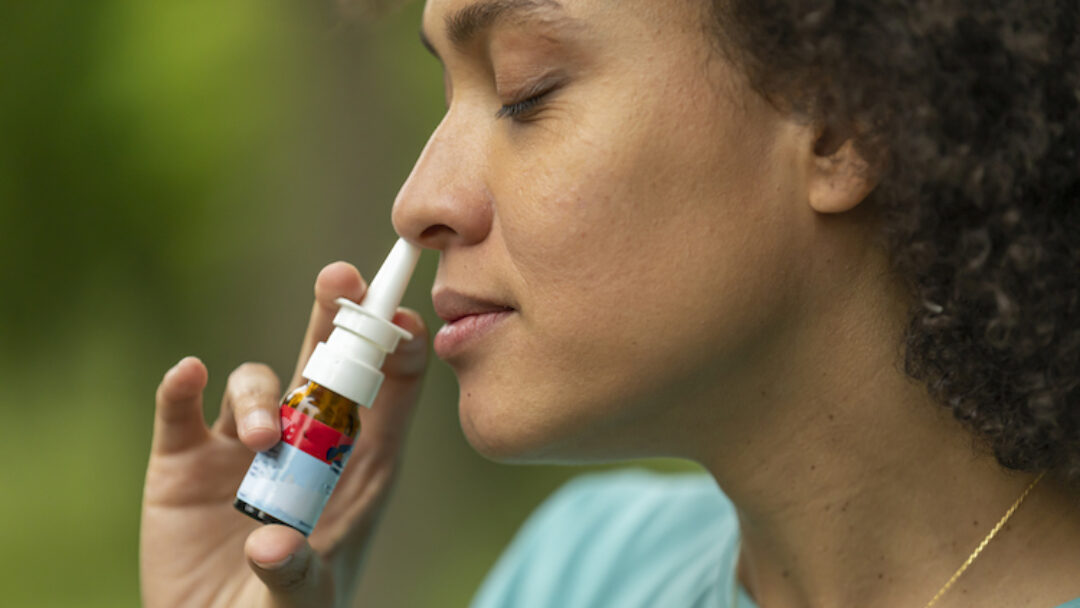This time of year you may be experiencing the sniffles, a runny nose, or nasal congestion? During allergy and cold season you may be frustrated in dealing with mucus or congestion.
There are so many over-the-counter options to help the congestion and nasal spray may appear to be a simple solution for relieving nasal congestion and runny nose. However, it is important to note that not all nasal sprays are equally effective. In fact, certain types of nasal sprays may cause dependency.
Can the use of nasal spray for temporary relief lead to addiction?
According to medical experts, excessive use of certain nasal sprays is typically caused by dependence. This dependency may be a result of the rebound effect.
The Rebound Effect: Differentiating Between Dependency and Addiction
The phenomenon known as the rebound effect can be observed when regularly utilizing nasal sprays, particularly those containing decongestants. Over time, the responsiveness of your nasal passages to the medication may decrease. This could lead to a recurrence of nasal congestion, or a “rebound” effect, upon discontinuing the medication. Consequently, you may find yourself needing to increase your usage in order to alleviate the congestion.
There is a common misconception that the rebound effect is equivalent to addiction. However that addiction to nasal sprays is not a genuine addiction. The definition of addiction is a serious disorder caused by substance abuse, where the individual continuously and compulsively uses the substance despite its harmful effects. Unlike this, over-the-counter nasal sprays do not create the same physical cravings.
Although nasal sprays do not cause a true addiction, they can result in adverse effects, including rhinitis medicamentosa (rebound congestion), chronic sinusitis, and other persistent issues. It is important to recognize these consequences when using nasal sprays.
For a better comprehension of the various types of nasal sprays and their safe usage, let’s delve into the four distinct categories.
Different Kinds of Nasal Sprays
Saline Sprays
Saline sprays that can be bought without a prescription are effective in reducing the thickness of mucus and purifying your nasal passages from pollen and other allergens.
Is it Addictive? No, these substances do not lead to irritation or dependence, although certain preservatives or additives may cause irritation for those who are sensitive to them.
The majority of commercially available nasal sprays contain the same level of saline as found in the human body. The labeling will typically indicate “saline” or “drug-free”. The primary ingredients to look for are sodium chloride (also referred to as salt) and sterilized water. While saline sprays can be beneficial, humidifiers can also be used as a substitute, particularly during dry seasons.
Corticosteroid Nasal Sprays
Nasal steroid sprays are commonly prescribed for reducing swelling and inflammation in the nasal passages. They offer a viable option for individuals who may experience adverse effects from oral medication.
Are they habit-forming? No, steroid nasal sprays are considered safe and a viable choice for seasonal and environmental allergies. However, if you require continued use of the spray for more than 6 months, it is advisable to consult with your doctor.
Search for steroid sprays that have corticosteroids in their composition. They may also be labeled as fluticasone propionate or triamcinolone acetonide. These medications can be found in various forms, some of which can be purchased without a prescription, while others require one. It is recommended to consult with your doctor and pharmacist to determine the most effective product for treating your symptoms.
Sprays with Antihistamines
Antihistamines work by inhibiting a substance in the body that triggers allergic reactions. Similar to steroid sprays, they can generate fewer adverse reactions compared to oral medication for certain individuals.
Is it Addictive? No, antihistamine sprays do not cause addiction.
Seek out sprays that have cromolyn sodium as an ingredient. These tend to be most effective when used either a week or two prior to allergy season to achieve maximum results. If you are unsure, consult with your physician or pharmacist to determine the most suitable product for managing your symptoms.
Nasal Decongestant Sprays
The use of decongestant sprays can effectively treat a runny nose or congestion by constricting the blood vessels in the nose and decreasing inflammation.
Is it Addictive? Yes, rebound congestion can result from the usage of decongestants such as oxymetazoline. Their effectiveness is limited to a brief duration and should be utilized cautiously for a maximum of 3 consecutive days.
One drawback of nasal decongestants is that individuals may require increased doses over time to achieve the desired result. Additionally, they may also face a rebound effect of congestion. This could lead to a dependence on the medication, as some individuals may tend to overuse it when their symptoms return upon discontinuing its use.
These can be utilized to alleviate temporary symptoms of a cold or flu, but it is advised to only use them for a maximum of three consecutive days. It is recommended to consult your physician before using a decongestant spray.
What Can I Do to End My Reliance on Nasal Spray?
The use of medications is intended to address health issues and improve well-being, but it can be challenging to distinguish between the effectiveness of a medication and becoming reliant on it. If you find yourself unable to discontinue the use of a nasal decongestant spray after 5 to 7 days, it is likely due to a rebound effect.
When discontinuing the use of a nasal spray, one may experience a reappearance of their initial level of nasal congestion and the recurrence of other symptoms, such as sneezing and a runny or itchy nose. It is advised to consult with a doctor or pharmacist on the most effective way to reduce the dosage of the medication in order to alleviate withdrawal symptoms.
What Measures Can I Take to Minimize the Risk of Rebounding?
To minimize the chances of reliance and potential adverse reactions, it is advised to take the minimum amount of medication for the shortest duration possible. In particular, restrict the usage of nasal decongestant sprays to a maximum of 3 days in a row and refrain from using them more than twice within a 24-hour period.E
Experts advise caution when using various nasal sprays, such as saline, steroid, and antihistamine sprays. It is important to monitor the frequency of use and assess if it is necessary. Some individuals may only require nasal spray use during allergy season or in dry and cold weather, which may only be a few months out of the year.
In general, nasal sprays are a reliable method for alleviating nasal congestion caused by allergies and colds, although the frequency of usage may differ. The most advisable course of action would be to consult your doctor or pharmacist regarding the most suitable over-the-counter or prescribed nasal spray for addressing your specific symptoms.








